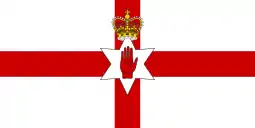North Armagh (Northern Ireland Parliament constituency)
North Armagh was a constituency of the Parliament of Northern Ireland.
| North Armagh | |
|---|---|
| Former County Constituency for the Parliament of Northern Ireland | |
.svg.png.webp) North Armagh shown within Northern Ireland | |
| Former constituency | |
| Created | 1929 |
| Abolished | 1972 |
| Election method | First past the post |
Boundaries
North Armagh was a county constituency comprising the northern part of County Armagh. It was created when the House of Commons (Method of Voting and Redistribution of Seats) Act (Northern Ireland) 1929 introduced first-past-the-post elections throughout Northern Ireland. North Armagh was created by the division of Armagh into four new constituencies. The constituency survived unchanged, returning one member of Parliament, until the Parliament of Northern Ireland was temporarily suspended in 1972, and then formally abolished in 1973.
The seat was centred on the town of Lurgan and included parts of the rural districts of Armagh and Lurgan.[1]
Politics
The seat was always won by Ulster Unionist Party candidates. It was contested on five occasions, three time by nationalist candidates, once by a Northern Ireland Labour Party member, and once by an independent Unionist. The nationalist and Labour candidates each took 30 - 40% of the votes cast.[2]
Members of Parliament
| Elected | Party | Name[2] | |
|---|---|---|---|
| 1929 | UUP | John Johnston | |
| 1945 | UUP | Dinah McNabb | |
| 1969 | UUP | Robert James Mitchell | |
Election results
 |
|---|
| This article is part of a series on the politics and government of Northern Ireland 1921–72 |
At the 1929, 1933 and 1938 Northern Ireland general elections, John Johnston was elected unopposed.[2]
| Party | Candidate | Votes | % | ±% | |
|---|---|---|---|---|---|
| UUP | Dinah McNabb | 8,645 | 64.1 | N/A | |
| NI Labour | Thompson Ferron | 4,849 | 35.9 | N/A | |
| Majority | 3,796 | 28.2 | N/A | ||
| Turnout | 76.9 | N/A | |||
| UUP hold | Swing | N/A | |||
| Party | Candidate | Votes | % | ±% | |
|---|---|---|---|---|---|
| UUP | Dinah McNabb | 9,705 | 65.6 | +1.5 | |
| Nationalist | John McAlinden | 5,099 | 34.4 | N/A | |
| Majority | 4,606 | 31.2 | +3.0 | ||
| Turnout | 79.2 | +2.3 | |||
| UUP hold | Swing | N/A | |||
At the 1953 Northern Ireland general election, Dinah McNabb was elected unopposed.[2]
| Party | Candidate | Votes | % | ±% | |
|---|---|---|---|---|---|
| UUP | Dinah McNabb | 9,584 | 81.1 | N/A | |
| Independent Unionist | Samuel Blevins | 2,230 | 18.9 | N/A | |
| Majority | 7,354 | 62.2 | N/A | ||
| Turnout | 61.1 | N/A | |||
| UUP hold | Swing | N/A | |||
At the 1962 Northern Ireland general election, Dinah McNabb was elected unopposed.[2]
| Party | Candidate | Votes | % | ±% | |
|---|---|---|---|---|---|
| UUP | Dinah McNabb | 8,546 | 68.2 | N/A | |
| National Democratic | John F. B. Elliott | 3,981 | 31.8 | N/A | |
| Majority | 4,565 | 36.4 | N/A | ||
| Turnout | 62.4 | N/A | |||
| UUP hold | Swing | N/A | |||
| Party | Candidate | Votes | % | ±% | |
|---|---|---|---|---|---|
| UUP | Robert James Mitchell | 9,087 | 60.8 | -7.4 | |
| National Democratic | Adrian James Kennedy | 5,847 | 39.2 | +7.4 | |
| Majority | 3,240 | 21.6 | -14.8 | ||
| Turnout | 72.3 | +0.9 | |||
| UUP hold | Swing | N/A | |||